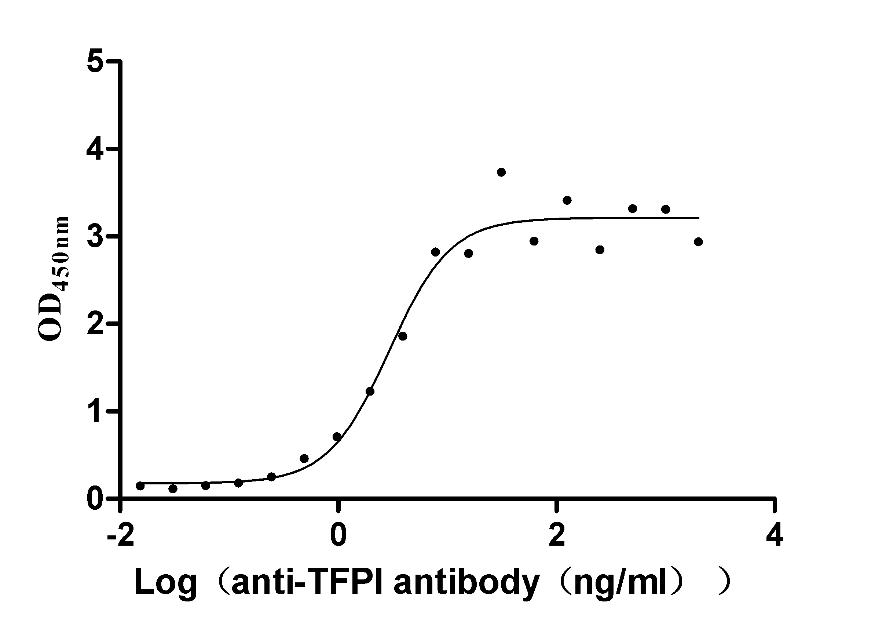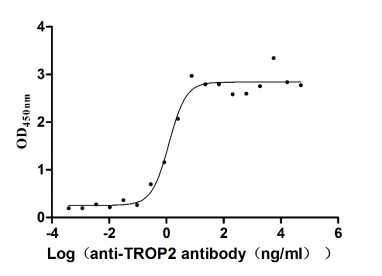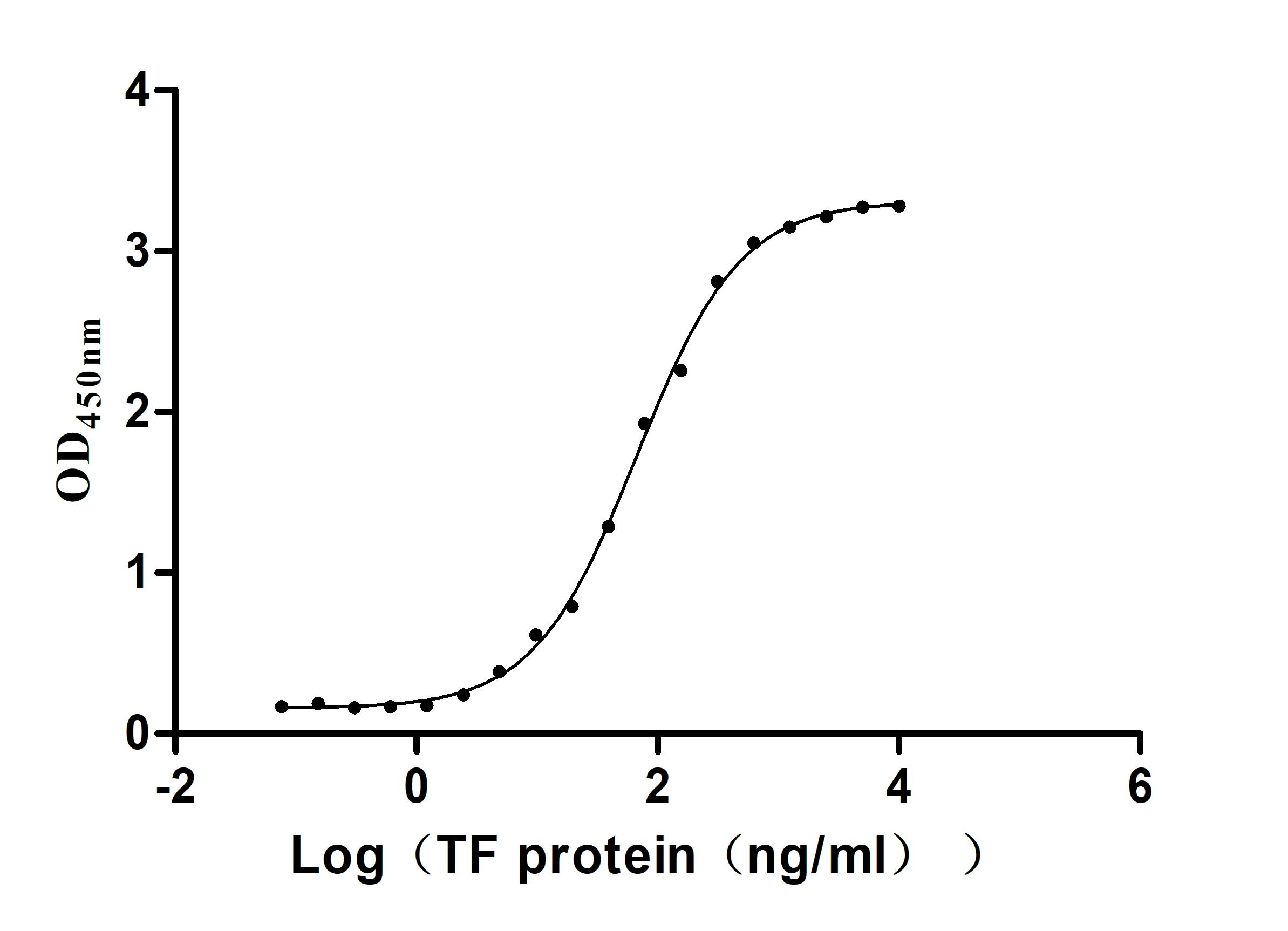Recombinant Human Myotilin (MYOT)
-
货号:CSB-YP015364HU
-
规格:
-
来源:Yeast
-
其他:
-
货号:CSB-EP015364HU
-
规格:
-
来源:E.coli
-
其他:
-
货号:CSB-EP015364HU-B
-
规格:
-
来源:E.coli
-
共轭:Avi-tag Biotinylated
E. coli biotin ligase (BirA) is highly specific in covalently attaching biotin to the 15 amino acid AviTag peptide. This recombinant protein was biotinylated in vivo by AviTag-BirA technology, which method is BriA catalyzes amide linkage between the biotin and the specific lysine of the AviTag.
-
其他:
-
货号:CSB-BP015364HU
-
规格:
-
来源:Baculovirus
-
其他:
-
货号:CSB-MP015364HU
-
规格:
-
来源:Mammalian cell
-
其他:
产品详情
-
纯度:>85% (SDS-PAGE)
-
基因名:MYOT
-
Uniprot No.:
-
别名:57 kDa cytoskeletal protein; LGMD 1; LGMD1; Myofibrillar titin like Ig domains protein; Myofibrillar titin-like Ig domains protein; Myot; MYOTI_HUMAN; Myotilin; Titin immunoglobulin domain protein; TTID; TTID protein
-
种属:Homo sapiens (Human)
-
蛋白长度:full length protein
-
表达区域:1-498
-
氨基酸序列MFNYERPKHF IQSQNPCGSR LQPPGPETSS FSSQTKQSSI IIQPRQCTEQ RFSASSTLSS HITMSSSAFP ASPKQHAGSN PGQRVTTTYN QSPASFLSSI LPSQPDYNSS KIPSAMDSNY QQSSAGQPIN AKPSQTANAK PIPRTPDHEI QGSKEALIQD LERKLKCKDT LLHNGNQRLT YEEKMARRLL GPQNAAAVFQ AQDDSGAQDS QQHNSEHARL QVPTSQVRSR STSRGDVNDQ DAIQEKFYPP RFIQVPENMS IDEGRFCRMD FKVSGLPAPD VSWYLNGRTV QSDDLHKMIV SEKGLHSLIF EVVRASDAGA YACVAKNRAG EATFTVQLDV LAKEHKRAPM FIYKPQSKKV LEGDSVKLEC QISAIPPPKL FWKRNNEMVQ FNTDRISLYQ DNTGRVTLLI KDVNKKDAGW YTVSAVNEAG VTTCNTRLDV TARPNQTLPA PKQLRVRPTF SKYLALNGKG LNVKQAFNPE GEFQRLAAQS GLYESEEL
-
蛋白标签:Tag type will be determined during the manufacturing process.
The tag type will be determined during production process. If you have specified tag type, please tell us and we will develop the specified tag preferentially. -
产品提供形式:Lyophilized powder
Note: We will preferentially ship the format that we have in stock, however, if you have any special requirement for the format, please remark your requirement when placing the order, we will prepare according to your demand. -
复溶:We recommend that this vial be briefly centrifuged prior to opening to bring the contents to the bottom. Please reconstitute protein in deionized sterile water to a concentration of 0.1-1.0 mg/mL.We recommend to add 5-50% of glycerol (final concentration) and aliquot for long-term storage at -20℃/-80℃. Our default final concentration of glycerol is 50%. Customers could use it as reference.
-
储存条件:Store at -20°C/-80°C upon receipt, aliquoting is necessary for mutiple use. Avoid repeated freeze-thaw cycles.
-
保质期:The shelf life is related to many factors, storage state, buffer ingredients, storage temperature and the stability of the protein itself.
Generally, the shelf life of liquid form is 6 months at -20°C/-80°C. The shelf life of lyophilized form is 12 months at -20°C/-80°C. -
货期:Delivery time may differ from different purchasing way or location, please kindly consult your local distributors for specific delivery time.Note: All of our proteins are default shipped with normal blue ice packs, if you request to ship with dry ice, please communicate with us in advance and extra fees will be charged.
-
注意事项:Repeated freezing and thawing is not recommended. Store working aliquots at 4°C for up to one week.
-
Datasheet :Please contact us to get it.
相关产品
靶点详情
-
功能:Component of a complex of multiple actin cross-linking proteins. Involved in the control of myofibril assembly and stability at the Z lines in muscle cells.
-
基因功能参考文献:
- sequence conservation analysis of myotilin shed light on the molecular basis of myotilinopathies and revealed several motifs in Ig domains found also in I-band proteins. PMID: 28638118
- A French family affected with a late onset proximal and distal muscle weakness and myofibrillar myopathy on muscle pathology, in which the siblings known to be clinically affected were homozygous for the c.179C>T (p.Ser60Phe) myotilin gene mutation is reported. PMID: 27854214
- Describe the first homozygous mutation in the myotilin gene leading to a novel, autosomal recessive subtype of myofibrillar myopathy (MFM). PMID: 24928145
- Analysis of myotilin turnover provides mechanistic insight into the role of myotilinopathy-causing mutations PMID: 21361873
- A second known pedigree with LGMD1A: this finding constitutes a gold standard of proof that mutations in the myotilin gene cause Limb-Girdle Muscular Dystrophy 1A PMID: 12428213
- Myotilin a thin filament-associated Z-disc protein.It binds to alpha-actinin and filamin c and is mutated in limb girdle muscular dystrophy 1A (LGMD1A).myotilin binds F-actin and prevents filament disassembly induced by Latrunculin A PMID: 12499399
- Mutations in myotilin cause MFM; exon 2 of MYOT is a hotspot for mutations; peripheral neuropathy, cardiomyopathy, and distal weakness greater than proximal weakness are part of the spectrum of myotilinopathy; not all cases have a limb-girdle phenotype PMID: 15111675
- Our findings provide evidence for a novel connection between the Z-disc protein myotilin and the sarcolemma via filamins and beta1 integrins. PMID: 16076904
- The function of the myotilin protein is studied with regards its actin-organizing properties. PMID: 16122733
- A novel mutation in the myotilin gene results in the clinical and pathologic phenotype termed "spheroid body myopathy." Mutations in this gene also cause limb-girdle muscular dystrophy 1A and are associated with myofibrillar myopathy. PMID: 16380616
- Mutations within the MYOT gene are not a cause for Vocal Cord and Pharyngeal Weakness with Distal Myopathy (VCPDM). PMID: 16674563
- multigenerational French family in which gene sequencing identified a S60F myotilin mutation in all patients with full penetrance despite very late onset PMID: 16793270
- Myotilin mutations promote aggregate-dependent contractile dysfunction similar to Limb-girdle Muscular Dystrophy type 1A and Myofibrillar Myopathy. PMID: 16801328
- Myotilin S55F mutations may cause a clinically distinct autosomal-dominant late-onset and lower-limb distal myopathic syndrome. MRI helps to depict the topography of fatty muscle atrophy and to detect gene mutation carriers. PMID: 17698502
- new autosomal dominant kindred with generalized symmetrical increase in muscle bulk PMID: 19027924
- This is the first report of a binding motif common to both the myotilin and the FATZ (calsarcin/myozenin) families that is specific for interactions with Enigma family members. PMID: 19047374
- Data show that in myofibrillar myopathies myotilin exhibites significant alterations in their localization. PMID: 19151983
- study presents high-resolution structure of the first Ig-domain of myotilin determined with solution state NMR spectroscopy; structure of MyoIg1 exhibits I-type Ig-fold PMID: 19418025
- identified a novel MYOT mutation in Exon 9 encoding the second immunoglobulin-like domain in 1 patient with clinically typical limb girdle muscular dystrophy PMID: 19458539
显示更多
收起更多
-
相关疾病:Limb-girdle muscular dystrophy 1A (LGMD1A); Myopathy, myofibrillar, 3 (MFM3); Spheroid body myopathy (SBM)
-
亚细胞定位:Cell membrane, sarcolemma. Cytoplasm, cytoskeleton. Cytoplasm, myofibril, sarcomere, Z line.
-
蛋白家族:Myotilin/palladin family
-
组织特异性:Expressed in skeletal muscle (at protein level). Expressed in skeletal muscle, heart, bone marrow and thyroid gland.
-
数据库链接:
HGNC: 12399
OMIM: 159000
KEGG: hsa:9499
STRING: 9606.ENSP00000239926
UniGene: Hs.84665
Most popular with customers
-
Recombinant Rabbit Tissue factor pathway inhibitor (TFPI) (Active)
Express system: Mammalian cell
Species: Oryctolagus cuniculus (Rabbit)
-
Recombinant Human Claudin-6 (CLDN6)-VLPs (Active)
Express system: Mammalian cell
Species: Homo sapiens (Human)
-
Recombinant Human Tumor-associated calcium signal transducer 2 (TACSTD2), partial (Active)
Express system: Mammalian cell
Species: Homo sapiens (Human)
-
Recombinant Macaca fascicularis CUB domain containing protein 1 (CDCP1), partial (Active)
Express system: Mammalian cell
Species: Macaca fascicularis (Crab-eating macaque) (Cynomolgus monkey)
-
Recombinant Human Serotransferrin(TF) (Active)
Express system: Mammalian cell
Species: Homo sapiens (Human)
-
Recombinant DT3C (Diphtheria toxin & spg 3C domain) for Antibody Internalization Assay (Active)
Express system: E.coli
Species: N/A



-AC1.jpg)














